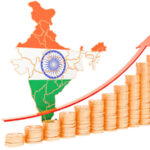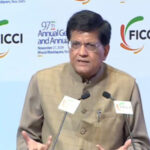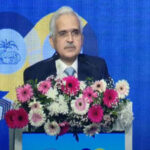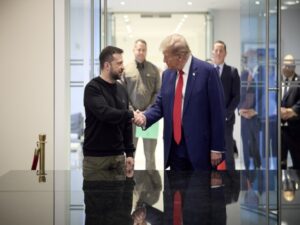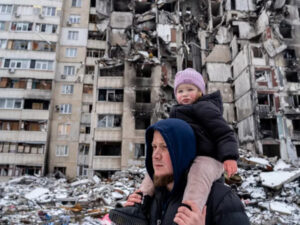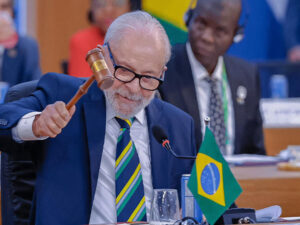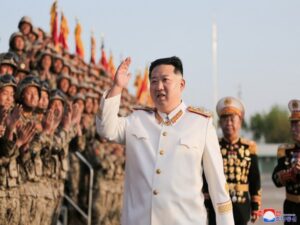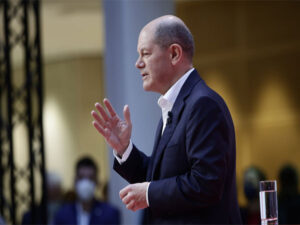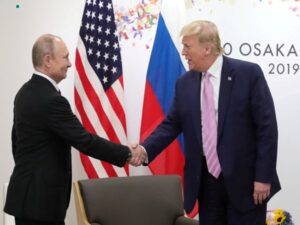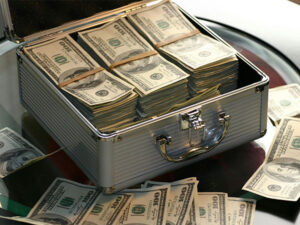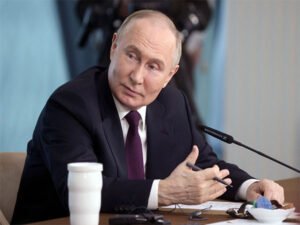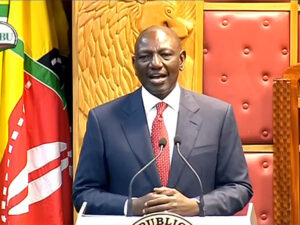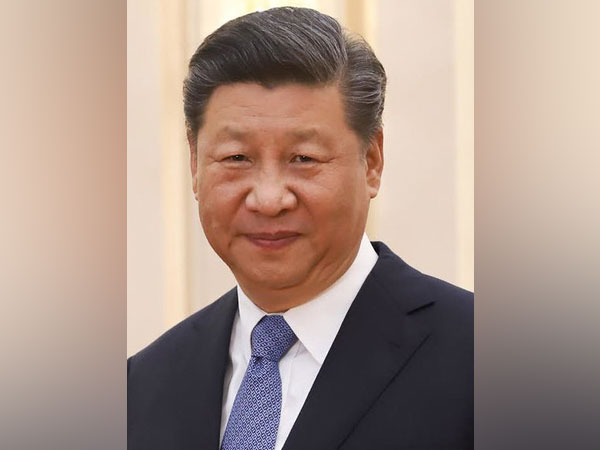
Chinese President Xi Jinping (File pic)
Hong Kong, April 7 (ANI): Chairman Xi Jinping is waging one of his toughest fights since assuming control of China , a bitter battle to retain legitimacy at home and to save China ‘s battered image internationally in light of its COVID-19 mishandling. Consequently, the world is seeing a deeper political and ideological war between China and the West as the former tries to whitewash its marred visage and absolve itself of any responsibility.
Early on, as the first coronavirus cases were appearing in late 2019, the Chinese Communist Party (CCP) sought to muzzle whistleblowers – actually medical personnel sounding warnings of a new type of aggressive virus – while Xi publicly ignored the issue entirely until after a CCP meeting had taken place on 7 January and an annual party plenary session occurred in Hubei after that.
It was only on 20 January that Xi made any public announcement, yet he still pointedly refusing to reference it in his annual Lunar New Year speech. In the meantime, millions of Wuhan citizens dispersed around China at Lunar New Year, many incubating the coronavirus .
Finally, the disease spread to the degree that China could not hide it anymore; by then it was too late – COVID-19 was already gaining footholds around the world. While China was smothering news and orchestrating a vast information blackout, the opportunity was lost to localize and isolate the virus.
A study by the University of Southampton, for example, found that if non-pharmaceutical interventions had been conducted one week, two weeks or three weeks earlier, then cases in China could have been reduced by 66%, 86% and 95% respectively. In an attempt to save national and political face, the CCP and its myriad underlings launched a panicky all-embracing campaign to change the whole narrative.
Indeed, if Chinese officials and media mouthpieces are to be believed, the world should be eternally grateful to Xi and the CCP for staving off a disaster and buying the world time. Doctor Jason Young, Director of the New Zealand Contemporary China Research Centre based at Victoria University of Wellington, spoke to ANI about this propaganda effort.
“I think the reason is that obviously the virus was found and started in China and, because for the first month or first couple of months of very little action, then the narrative that created was that China bungled or didn’t do a very good job at dealing with the virus when it first came about.” Young added that the mishandled episode allowed people to first get out of Wuhan and then for people to travel abroad, which resulted in the pandemic that exists today.
“And so, from a Chinese government’s perspective, that’s obviously a very dangerous narrative for them…domestically as that would suggest that the government’s, and particularly the public health response, was inadequate.” Young, an associate professor of political science and international relations at Victoria University, elaborated: “That’s dangerous for their legitimacy.
And then secondly, it’s a complete public relations disaster for China internationally. And so they’ve tried to, first of all, create a sort of disinformation campaign to unpick parts of that very simple narrative and create other narratives. And at the same time, they’re now really doubling down and focusing on the idea that they, the Chinese government, made amazing efforts at containing the virus and therefore it was doing a solid favor to the rest of the world and protecting them from the virus. And then, even now, they’re also moving towards trying to shape the narrative that China has taken a responsible effort towards the virus and that it’s leading efforts globally to deal with the crisis.”
Chinese stooges, often embassies or officials using platforms such as Facebook, Instagram, and Twitter – which are all banned in China – have been tongue-lashing anyone who reminds the world of the virus’s origin in Wuhan, for example. Meanwhile, Chinese media went back through all their previous reports and expunged terms like “Wuhan virus”. Phrases like “wantonly attacking and smearing the CCP and the Chinese government with vicious language”, “ideological prejudice” and media reports that are “exaggerated, full of irresponsible rumors and highly politicized” are being thrown around with wild abandon.
Perhaps one of the lowest points in Beijing’s desperation was when it blamed the US Army for bringing the virus to Wuhan. Lijian Zhao, a pugnacious spokesman for China ‘s Ministry of Foreign Affairs, tweeted this sort of conspiracy theory on 13 March: “It might be US army who brought the epidemic to Wuhan. Be transparent!
Make public your data! US owe us an explanation!” In a similar fashion, colleague Hua Chunying tweeted on 4 April, “The criteria for media should be truth, fairness, and impartiality…The US shouldn’t oppress Chinese media out of an ideological basis.” China and its officials simply do not grasp the irony. Within China, which recently kicked out several American publications, all media is considered a propaganda arm of the CCP. Young called such measures “extraordinary”.
He added, “I mean, we haven’t seen that since the Mao era.” China ‘s nationalistic rhetoric resulted in one village hanging up a repulsive banner celebrating, “Warmest congratulations to the US for confirming 100K COVID-19 cases.” It is alleged that last year, amidst deteriorating relations with the West, Xi ordered diplomats to display more “fighting spirit”. In other words, he was ordering a more confrontational and hawkish tack.
Thus, more than 60 Chinese diplomats or diplomatic missions established Twitter or Facebook accounts in the past twelve months to give more vociferous pushback. This is especially true with younger Chinese diplomats imbued with the notion of destiny for an inexorably rising China . At home, the CCP continues to clamp down hard on any who criticize the government’s COVID-19 record.
Thus, Tsinghua University law professor Xu Zhangrun, human rights attorney Xu Zhiyong and Doctor Ai Fen of Wuhan all disappeared in February after blaming the government. No country has turned pandemic relief efforts into a political game to the degree China has. State media trumpets ad nauseam how it has sent (or more typically, sold) medical supplies and equipment to foreign countries.
Indeed, China is seeking every opportunity to raise its profile through such “facemask diplomacy”, only to find egg on its face on a number of occasions when the materials it had supplied turned out to be shoddy or substandard. Young acknowledged that Chinese propaganda is mostly directed at “its own audience, its own people because the key is that, to maintain the one-party state, you need to have a population which supports that governance structure”.
However, the difference now is that Beijing is prosecuting a vociferous and “very strong international campaign ” in parallel. “They’ve obviously made a decision that they need to fight the narrative, and then they need to try to give sorts of reasons for their own people to think favorably about the Chinese government’s response, but also to counter what was emerging with very strong condemnation of China ‘s response to COVID-19,” Young explained to ANI.
International agencies such as the World Health Organization (WHO ) have also disgraced themselves throughout this pandemic. It turns out that its head, Tedros Adhanom of Ethiopia, enjoyed strong Chinese support when voted in. On social media, Tedros has offered fawning praise for the Chinese regime, even when the rest of the world knew better. On 14 January, WHO infamously tweeted, “Preliminary investigations conducted by the Chinese authorities have found no clear evidence of human-to-human transmission of the novel #coronavirus (2019-nCoV) identified in #Wuhan, #China .” WHO made the mistake of trusting China.
Of course, very few believe the data that China is releasing about its number of COVID-19 cases and death toll. For example, health officials are alleged to have been told to stop testing in order to halt the number of reported cases, simply because that was the narrative China wanted at that juncture. Truth is the first casualty in any CCP campaign, although in this case there have been thousands of other casualties – those who caught the virus.
China ‘s official death toll stands at 3,331, but many believe in Wuhan it is more likely to be 40,000. It is possible the authorities may not have accurate data either, as many victims simply were not tested. When Xi Jinping declared victory, a victory it had to be; no other outcome could be tolerated.
Mao once said, “Everything under heaven is in utter chaos, the situation is excellent.” What he meant was that the disorder provides unique opportunities. China perhaps senses this. What started as a massive embarrassment, Beijing is attempting to reverse amidst a huge strategic opportunity especially as its competitors reel and are overwhelmed by the pandemic.
With agencies such as WHO proving their ineptitude and with governments such as the USA and UK demonstrating indecisiveness, China is trying to make hay by stepping up its propaganda, painting itself as a world hero saving the world after vanquishing the enemy at home. The question is, will the world allow China to get away with this totally false narrative, or will it push back with united vigor and hold China to account for its deception and obfuscation?
Xi, in his G20 speech on 26 March likened China as a responsible global power bringing hope to the world. He said, “From day one of our fight against the outbreak, we have put people’s life and health first,” conveniently forgetting that he actually put the CCP first.
He also spoke of the need to protect the weak “and other vulnerable groups”, ignoring the fact that he is personally responsible for incarcerating hundreds of thousands in Xinjiang concentration camps simply because they are Muslims. Their fate in overcrowded camps amidst the virus outbreak is unknown.
The same brazen-faced duplicity occurred with the Wuhan virus, where lying is second nature in order to save face for Xi and the CCP. Yet China inexplicably sees no paradox at all. The world is just beginning to taste China ‘s “vision of building a community with a shared future for mankind”. This is in parallel to a massive military build-up, gray zone coercion in disputed territories and economic coercion.
As Thomas Jefferson said, “The price of democracy is eternal vigilance.” It seems many in the world are still not on guard against Chinese lies and the need to hold the regime accountable for its abuses.
Interestingly, few have been as forthright as Cardinal Bo, the archbishop of Yangon in Myanmar, who demanded: “There is one government that has primary responsibility for what it has done and what it has failed to do, and that is the CCP regime in Beijing … The Chinese regime led by the all-powerful Xi and the CCP – not its people – owes us all an apology, and compensation for the destruction it has caused … For the sake of our common humanity, we must not be afraid to hold this regime to account.” For his part, Young assessed that “Xi Jinping ‘s image internationally, particularly in Western countries, has been really, really tarnished by COVID-19”. (ANI)

